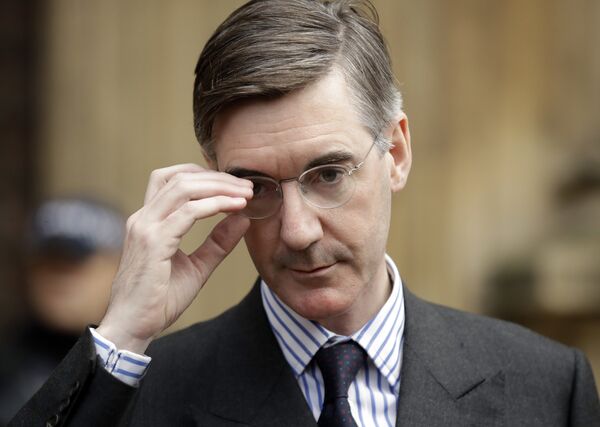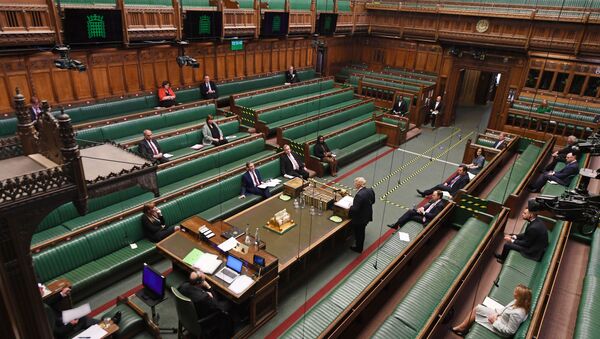MPs have voted to suspend virtual proceedings and go back to face-to-face debate but many are upset about the lack of protection.
Because of social distancing rules MPs were forced to queue in a huge line outside the building and Labour MP Jess Phillips said the system resembled the line for a theme park ride. MPs took turns to tweet about the chaos, which trended as #moggconga.
Jacob Rees-Mogg, the Leader of the Commons, said virtual politics was "no longer necessary” and said a resumption of normal working would be "much more effective."
This is ridiculous - voting pic.twitter.com/MjDaZ4W0uv
— Luke Pollard MP (@LukePollard) June 2, 2020
Labour MP Margaret Hodge and Conservative backbenchers Robert Halfon, Caroline Nokes and Julian Knight said it would be “democratically unjust” to return to Parliament when some MPs cannot return in person because they are self-isolating due to age or underlying health issues.
— Chris Bryant (@RhonddaBryant) June 2, 2020
Mrs Hodge, who is 75 and has been MP for Barking in east London since 1994, said: ”I feel both discriminated against and disenfranchised. We should be holding the government to account. We can't if we don't have the right to vote.”
Mr Halfon, who has cerebral palsy, said the government was being "harsh and unbending" and added: "The MPs who genuinely cannot come in, our democratic rights are being snipped away and we're being turned into parliamentary eunuchs."
— Jess Phillips MP (@jessphillips) June 2, 2020
Halfon, Nokes and Knight backed an amendment brought by former Northern Ireland Secretary Karen Bradley which would have allowed for the continuation of virtual voting.
But MPs voted by 242 to 185 against Ms Bradley's amendment.
This queue is so long I just saw one MP using google maps #moggconga
— Kevin Brennan MP (@KevinBrennanMP) June 2, 2020
MPs then voted by 261 votes to 163 in favour of the government's proposition that MPs must return to Parliament but be "physically within the parliamentary estate" in order to participate in debates and votes.
But Mr Rees-Mogg said he would put forward a plan on Wednesday, 3 June, to allow MPs who cannot attend for physical reasons to participate remotely. But they would not be able to vote unless they were in the building.
The queue stretches to Portcullis House. The world’s worst fairground attraction queue. #moggconga pic.twitter.com/0ShstdeOe7
— Liz Saville Roberts AS/MP (@LSRPlaid) June 2, 2020
Since late March, Parliament has adopted a hybrid system where only 50 MPs at a time are allowed into the House of Commons chamber and Zoom screens allowed the remaining 600 to participate in the debate and vote.
— Munira Wilson MP (@munirawilson) June 2, 2020
But the government, believing coronavirus has peaked, wants MPs to return to Westminster and vote in person.
Mr Rees-Mogg said they should be setting a “return to work” example to the country and he told a parliamentary magazine: “The virtual Parliament brought us through the peak of the pandemic but it is no longer necessary to make the compromises it demanded. We can do so much better.”
Kevin Brennan, voting aye in the #MoggShambles. #MoggConga pic.twitter.com/KoyVhzh1qf
— Haggis_UK 🇬🇧 🇪🇺 (@Haggis_UK) June 2, 2020
Mr Rees-Mogg said Parliament said hand sanitiser dispensers would be available and the floor would be marked to enforce social distancing in a “COVID-secure workplace.”

There have been an estimated 45,000 coronavirus deaths in Britain since February and London has been one of the worst affected places.
The government has taken a fully functioning digital voting system which took 15mins per vote in which all MPs could participate and replaced it with a queuing system taking 45mins per vote in which only 2/3 of MPs can participate. Not a great advert for government effectiveness.
— Hannah White (@DrHannahWhite) June 2, 2020
Prime Minister Boris Johnson is gradually easing the nationwide lockdown, with many children returning to school this week, shops like Ikea opening and Premier League football due to return on 17 June, all be it without fans.
— Jeff Smith (@JeffSmithetc) June 2, 2020
But critics of the government say the lockdown is being eased too soon and could lead to a second wave of infections.
Lindsay Hoyle, who was elected as the new Speaker in November, said he was worried about the possibility of infection in the traditional voting lobbies, where MPs crowd in to small rooms to vote Yes or No.
The vote on whether to return to voting in person will take place later on Tuesday evening, following a debate.
The House of Lords - whose average age is 70 - is not returning to Parliament and peers will be voting by smartphone.


